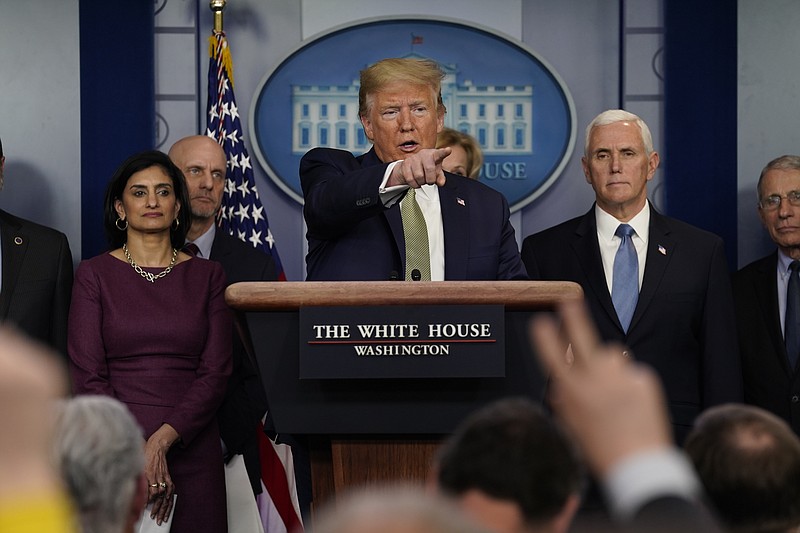WASHINGTON (AP) - President Donald Trump is asking Congress to unleash a torrent of emergency economic aid - including direct checks to Americans - in an extraordinary effort to shore up households and the economy in the coronavirus crisis.
As part of a proposed economic rescue not seen since the Great Recession in 2008, Trump wants checks sent to the public within two weeks as part of a package that officials said could approach a cost of $1 trillion. Congressional leaders vowed swift action. Treasury Secretary Steven Mnuchin appeared on Capitol Hill to brief Senate Republicans as state and local officials acted more forcefully to restrict gatherings and mobility in the face of growing sickness.
"We want to go big," Trump said at a White House briefing. "We want to get it done and have a big infusion."
Senate Majority Leader Mitch McConnell promised the Senate would not adjourn until the package was passed.
"Obviously, we need to act," McConnell said after meeting White House officials at the Capitol.
But first, McConnell said, the Senate will vote on the House's $100 billion package of sick pay, emergency food and free testing that's on track for Trump's signature - a sign of how difficult it will be for Congress to consider the new, bigger effort.
Senators gathered as Americans across the country were implored to heed advice and avoid crowds. Even so, presidential primary elections unfolded in Florida, Illinois and Arizona. Ohio's was called off hours before the polls were set to open.
After a drop at the start of the week, the stock market rose during Trump's briefing as he and aides sketched out elements of the economic rescue package.
Bigger than the 2008 bank bailout or the 2009 recovery act, the White House proposal aims to provide a massive tax cut for wage-earners, $50 billion for the airline industry and $250 billion for small businesses.
Two people familiar with the request described it to the Associated Press on the condition of anonymity because they weren't authorized to speak publicly.
"This is a very unique situation," Mnuchin said while exiting a briefing of Senate Republicans. "We've put a proposal on that table that would attract a trillion dollars into the economy." One GOP leader, Sen. John Thune, of South Dakota, told reporters afterward it "could be" up to $1 trillion.
"A lot of our members believe that we need to be bold and big," Thune said.
Senate Democrats produced their own $750 billion proposal, which includes $400 billion to shore up hospitals and other emergency operations in response to the global pandemic and $350 billion to bolster the safety net with unemployment checks and other aid to Americans.
"The aid has to be workers first," Senate Minority Leader Chuck Schumer said, not what happened in 2008, when the big banks took precedence. Schumer also said it's time to call out the National Guard to provide security as communities reel from the crisis.
House Speaker Nancy Pelosi and the chairman of the House Transportation Committee, Rep. Peter DeFazio, of Oregon, spoke by phone with Mnuchin in the morning. The Democrats "emphasized that protecting workers' paychecks and benefits was their top priority, and that immediate action was needed," said Drew Hammill, Pelosi's spokesman.
Congress was being asked to approve the most far-reaching economic rescue package since the Great Recession.
It's an enormous political and economic undertaking as a slow-moving Congress tries to rise to the occasion of these fast times.
"There's great spirit" among lawmakers, Trump said. "I can say that for Republicans and Democrats."
Some GOP senators were skeptical about the massive aid on the table. "I'm going to be very leery of doing something like in 2008," Indiana Republican Sen. Mike Braun said.
However, the other senator from Indiana, Todd Young, chairman of the Republican Senate campaign committee, said he was open to approving $1,000 checks and wants aid out the door as soon as possible. He noted the sudden change of American life, and said he was the only passenger on his flight back to Washington.
Some senators boarded planes returning to a changed Washington, as Trump declared a state of emergency, the virus spread and the economic free-fall worsened. Despite federal guidelines against so many people gathering, senators had no choice but to convene. The House is on a recess.
The White House hopes the measure will pass quickly, possibly this week, as the administration scrambled to contain the economic fallout of the outbreak.
The new proposal is beyond the House's estimated $100 billion aid package of sick pay, emergency food aid and free virus testing that was approved over the weekend and is pending before the Senate.
Now Congress will be rushing to pass two measures or combine them into one, altogether a sweeping response.
All sides - the House, Senate and White House - agree more federal resources are needed to handle what's coming.

